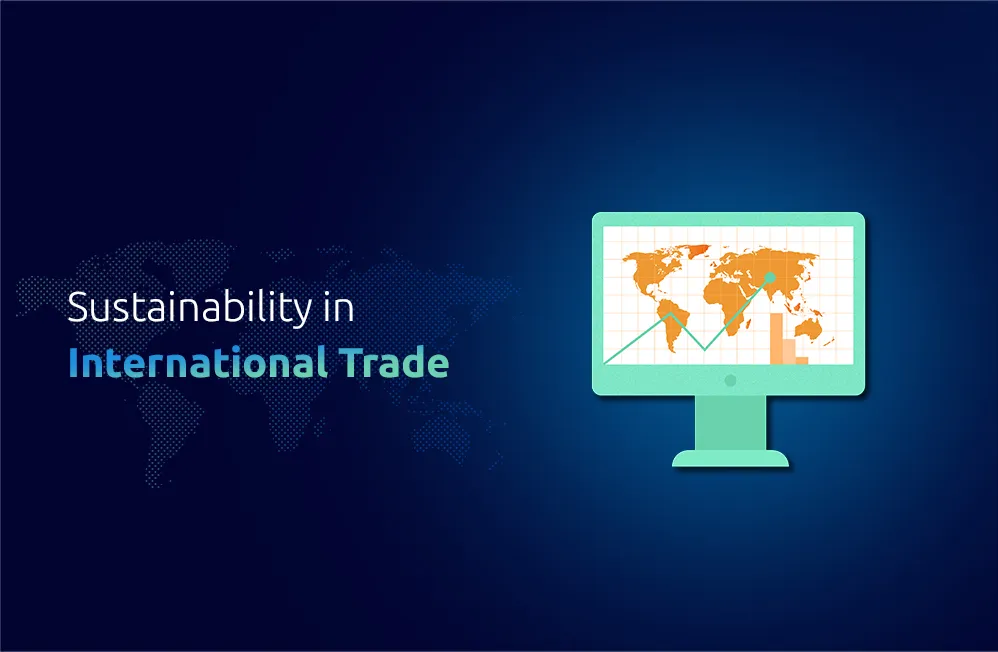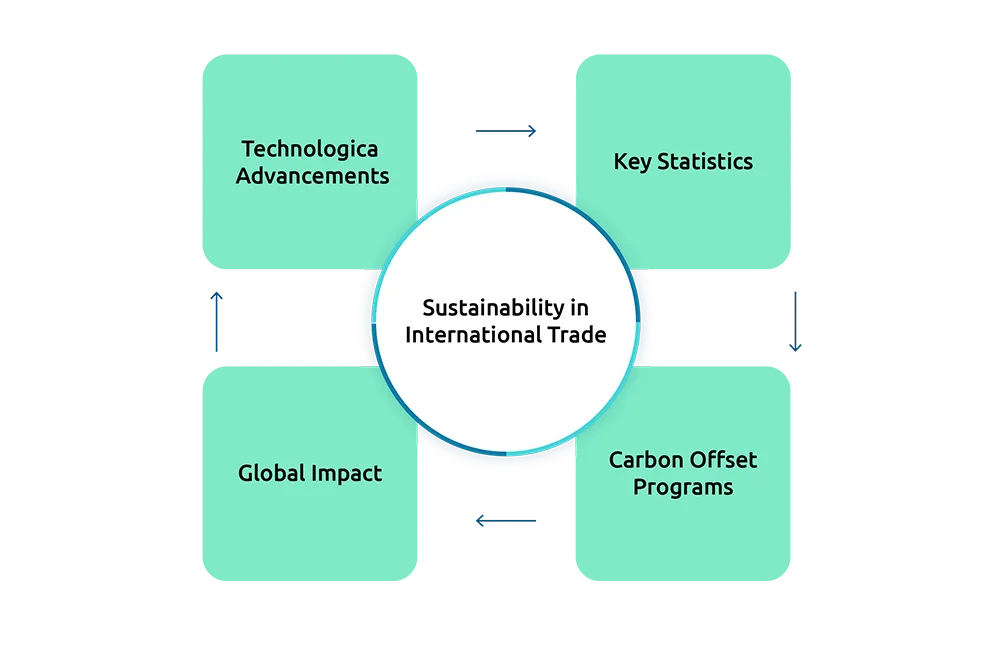Sustainability in International Trade: Financial and Operational Considerations
International trade is at the core of our international economy, allowing the activity of goods, services and capital across borders. Yet, as our world becomes ever more connected, its environmental and financial impacts are becoming increasingly scrutinized. International trade sustainability goes far beyond environmental considerations; it also encompasses businesses involved in import-export trade. This blog explores both financial and operational aspects of sustainability in international trade, with particular attention paid to how businesses in sectors such as aviation, healthcare, automotive, and IT can adopt sustainable practices that contribute both long-term profitability and global responsibility.
Sustainable Trading in an Era of Globalisation
Traditional Trade is associated with both environmental and financial costs.
International trade, while essential to economic development, has historically come with significant environmental and financial costs. From carbon emissions produced by shipping or air freight companies to hidden costs of supply chain inefficiencies, businesses involved with global commerce often operated within an opaque system where their true environmental impact and long-term financial implications were often disregarded.
As reported by the WTO, transportation is one of the foremost supporters of global carbon emissions, with international freight accounting for much of this figure. Businesses reliant on traditional trade practices may experience financial volatility due to supply chain shifts, tariff changes, or unpredictable shifts in global markets. With increasing consumer understanding of climate change and sustainability, companies are being challenged to balance profit with purpose. The financial burden associated with environmental damage, inefficient supply chains, and regulatory compliance is prompting the industry to reconsider its trade approaches; sustainable practices have become an integral component of long-term business resilience and must, therefore, be adopted for compliance purposes and long-term resilience purposes.
Key Aspects of Sustainability in International Trade
Financial Sustainability through Efficient Supply Chains
Supply chain optimization is one of the key principles of sustainability in international trade, impacting both environmental and financial sustainability directly for import and export businesses.
Reducing carbon emissions of trade operations, for instance, can bring many advantages: lower energy costs and fuel efficiencies increase, overheads are cut down significantly, companies that implement smarter logistics like optimizing shipping routes or using greener forms of transport can dramatically lower environmental impact while saving money; AI and data analytics can be used to anticipate demand, streamline inventory more efficiently, and manage supply chains more effectively.
Tariffs, Trade Barriers, and Sustainable Import-Export Policies
International trade policies have long been an issue for international businesses. One example of government efforts towards sustainability in global trade is carbon tariffs or “green tariffs”. These tariffs penalize companies engaging in environmentally harmful practices while rewarding those adhering to green standards.
As sustainability grows to a bigger part of international trade deals, companies that import and export must change with the times and adapt to new rules. In the European Union, the Green Deal plan seeks to achieve climate neutrality in Europe by 2050, and the USMCA trade deal includes provisions for environmental protection. The two of these show how trade policies are changing to encourage greener behavior. Businesses may have to pay more to comply with changes at first, but they also bring possibilities. Companies that invest in cleaner production methods that use less energy or meet strict environmental standards will find themselves well-positioned to avoid carbon penalties and take advantage of trade incentives that promote sustainability.
Long-Term Investment and Financing for Trade
“Businesses in many areas, like aviation, healthcare, automotive, and IT equipment, are finding it easier to get long-term loans. Contributing money to projects that are good for the environment, like investing in an industry that uses green energy sources or making logistics networks use less energy, is what green bonds are all about. On the other hand, ESG-focused asset funds look for companies that meet certain sustainability standards, such as reducing their impact on the environment, improving working conditions, and fighting for ethical governance.
When businesses that import and export use ESG principles in their financial plans, it makes it easier for them to get cash, improves their brand image, and helps them grow. Businesses that use environmentally friendly methods will gain more than just more money. Investors, partners, and users will trust the business more.”
Technology & the shift to digital in business
In the current digital world, global trade depends on technology to make it more sustainable. Everyone uses technologies like blockchain, AI, & IoT to make trade more open, efficient, & good for the environment. Blockchain has changed the way goods can be tracked, letting customers & businesses see where goods come from and where they end up, as well as making sure that goods follow environmental regulations. Blockchain also helps foreign traders cut down on fabrication, improve security, and make the supply chain more open. It makes sure that goods meet the sustainability standards set by both customers and regulators.
Artificial intelligence & machine learning are transforming the way trade is done by finding the best routes, predicting demand, and making it easier to keep track of goods. Businesses that use these tools can cut down on prodigal actions like transportation costs by using AI and machine learning to make more useful choices based on data. This helps the environment and saves money for the business.
What One Union Solutions Can Do for Long-Term International Trade
We are Importer of Record (IOR) and Exporter of Record (EOR) experts at One Union Solutions. We work with industries like aviation, healthcare, automotive, and IT tools. As more businesses realize how important sustainability is in international trade, it has never been more important for us to help them deal with the complicated issues that come up when doing business across borders.
We help our customers by making sure that the ways they import and export goods are not only legal in international trade but also in line with environmentally friendly methods. We know how to handle the complicated parts of global trade and care about the environment; businesses that want to do well in a market that cares more and more about trusting us, companies can make their import and export processes more efficient and make sure they meet the best standards for sustainability by using our services.
Did You Know,
According to calculations by the World Trade Organization (WTO), international freight transit contributes 2.5% of global carbon emissions annually – emphasizing the imperative for sustainable international trading practices.
FAQs:
1: What does it mean for global trade to be sustainable?
Ans: In global trade, sustainability means using methods that are good for the environment, making supply chains work better, and guaranteeing long-term financial stability. Its main goals are to cut down on pollution, make better use of resources, and use ethically sourced materials in cross-border trade.
- What can companies do to make foreign trade less harmful to the environment?
Ans: Businesses can have less of an effect on the environment by planning the shipping routes more efficiently, using energy-efficient ways to move goods, embracing green supply lines, and making products that can be recycled or used again.
- What are “green tariffs”? What do they mean for trade?
Ans: Green duties are taxes put on goods that come from other countries that don’t meet certain environmental standards. To avoid extra costs, they tell businesses to use eco-friendly methods when making and sending goods.
- How can technology help trade be more eco-friendly?
Ans: Technologies like AI, blockchain, and IoT help improve supply chain openness, streamline logistics, and cut down on waste. This makes operations more efficient and lowers carbon footprints.
- Why is long-term borrowing important for trade between countries?
Ans: Sustainable finance, like green bonds and ESG investments, gives businesses the money they need to adopt practices that are better for the environment, make their operations better, and reach new markets, all while meeting global sustainability goals.












